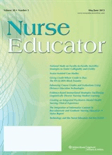
Nurse Educator
Scope & Guideline
Inspiring the Future of Nursing Education and Practice.
Introduction
Aims and Scopes
- Innovative Teaching Strategies:
The journal emphasizes the development and evaluation of novel pedagogical approaches, including simulation, gamification, and online learning, to enhance student engagement and learning outcomes. - Diversity, Equity, and Inclusion:
A core focus is on integrating diversity, equity, and inclusion principles into nursing curricula, aiming to prepare culturally competent nurses who can effectively serve diverse populations. - Evidence-Based Practice:
The journal promotes the incorporation of evidence-based practices in nursing education, ensuring that curricula are grounded in the latest research findings and clinical guidelines. - Interprofessional Education:
It supports collaboration between nursing and other healthcare disciplines to foster teamwork and improve patient outcomes through shared learning experiences. - Student Well-Being and Resilience:
Recognizing the challenges faced by nursing students, the journal addresses strategies to promote mental health, resilience, and well-being in nursing education. - Technology Integration:
The use of technology, including virtual simulations and AI tools, is a recurring theme, highlighting its role in enhancing learning experiences and clinical preparedness. - Curriculum Development and Assessment:
The journal also focuses on effective curriculum design and assessment strategies to ensure nursing programs meet educational standards and prepare graduates for practice.
Trending and Emerging
- Integration of Social Determinants of Health:
There is an increasing focus on teaching social determinants of health within nursing curricula, preparing students to address health disparities and the broader context of patient care. - Mental Health and Wellness Initiatives:
A growing emphasis on mental health education and strategies to support the well-being of nursing students is evident, reflecting a broader awareness of the importance of mental health in healthcare. - Use of Simulation and Virtual Learning:
The integration of simulation and virtual learning tools in nursing education is trending, particularly in response to the COVID-19 pandemic, which has accelerated the adoption of technology in teaching. - Cultural Competence and Sensitivity Training:
Training in cultural competence and sensitivity is becoming increasingly prominent, ensuring that future nurses can provide equitable care to diverse populations. - Focus on Faculty Development and Support:
There is a notable trend towards enhancing faculty development programs to support educators in adopting innovative teaching methods and addressing challenges in nursing education. - Artificial Intelligence in Education:
The use of AI tools and technologies in nursing education is emerging as a significant theme, with research exploring their potential to enhance teaching and learning processes.
Declining or Waning
- Traditional Lecture-Based Teaching:
There is a noticeable decrease in articles focusing on traditional lecture methods as more innovative and interactive approaches gain favor among educators. - Single-Dimensional Evaluations:
The emphasis on standardized testing and single-dimensional assessments is diminishing, giving way to more holistic and formative evaluation techniques that consider multiple competencies. - Focus on Content Delivery:
There is a waning focus on mere content delivery, with a shift towards experiential learning and application of knowledge in real-world settings. - Isolation in Nursing Education:
The trend towards collaborative and interprofessional education indicates a decline in isolated nursing education practices that do not involve other health disciplines. - Static Curriculum Models:
Static and rigid curriculum models are less prevalent, as there is a growing recognition of the need for agile curricula that can adapt to changing healthcare needs and societal demands.
Similar Journals

JOURNAL OF FURTHER AND HIGHER EDUCATION
Elevating Research in Further and Higher EducationJournal of Further and Higher Education, published by Routledge Journals, Taylor & Francis Ltd, stands as a prominent platform in the field of education, with a distinguished focus on further and higher education studies. With an ISSN of 0309-877X and E-ISSN of 1469-9486, this journal has been contributing invaluable insights since its inception in 1977. The journal boasts a remarkable Q1 ranking in its category for 2023, placing it in the top tier of educational research, underscored by its 83rd percentile ranking among Scopus Ranks in Social Sciences - Education. Researchers and practitioners alike are encouraged to submit their work, as the journal aims to foster innovative discussions and disseminate high-quality scholarly articles that address contemporary challenges in further and higher education. With its commitment to academic excellence, Journal of Further and Higher Education plays a crucial role in shaping policy and practice in the educational landscape, ensuring that the voices of educators and learners are heard and valued.
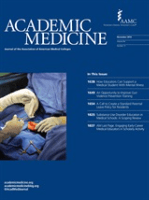
ACADEMIC MEDICINE
Elevating Standards in Medical TrainingACADEMIC MEDICINE is a premier journal published by Lippincott Williams & Wilkins, focusing on the multifaceted realm of medical education and training. Since its inception in 1940, the journal has become an essential resource for researchers, educators, and healthcare professionals dedicated to advancing the field of academic medicine. With an impressive Q1 ranking in both Education and Miscellaneous Medicine categories as of 2023, it ranks among the top publications in its field, reflective of its significant academic impact. The journal is indexed in Scopus, where it holds a commendable position within the 93rd percentile of Social Sciences Education, affirming its influence on contemporary medical education discourse. While not an open-access journal, ACADEMIC MEDICINE is committed to disseminating high-quality research, fostering knowledge exchange, and encouraging innovation in medical training across the globe. It serves as a critical platform for sharing the latest findings and practical insights in medical education, making it an indispensable resource for scholars and practitioners aiming to enhance their academic and clinical expertise.
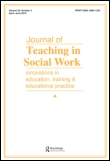
Journal of Teaching in Social Work
Shaping the Future of Social Work TeachingJournal of Teaching in Social Work is a premier academic publication dedicated to advancing the practice and study of social work education. Published by Routledge Journals, Taylor & Francis Ltd, this esteemed journal has been serving the academic community since 1987 and continues to shape discourse through its rigorous exploration of innovative teaching methodologies and pedagogical strategies in social work. With a significant presence in diverse categories, it holds commendable rankings in Education (Q3), Social Work (Q4), and Sociology and Political Science (Q2) for the year 2023, highlighting its impact in the field. Although it does not offer open access, the journal provides valuable insights that contribute to the professional development of educators, researchers, and practitioners alike. As a pivotal component of the scholarly exchange in social work education, the Journal of Teaching in Social Work remains indispensable for those looking to enhance their understanding and practices in this vital field.
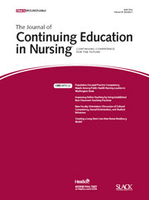
JOURNAL OF CONTINUING EDUCATION IN NURSING
Empowering Nursing Excellence Through Lifelong Learning.JOURNAL OF CONTINUING EDUCATION IN NURSING, published by SLACK INC, is an esteemed journal dedicated to the field of nursing education and professional development. Since its inception in 1970, it has actively contributed to the growth of nursing knowledge and practice, making it an essential resource for educators, practitioners, and researchers alike. The journal holds a solid standing with an impact factor reflecting its importance, categorized as Q2 in Nursing (Miscellaneous) and Review and Exam Preparation, and Q3 in Education according to the 2023 rankings. With a mission to support ongoing education among nursing professionals, it provides a platform for innovative research, evidence-based practices, and comprehensive reviews that enhance nursing education. The journal is accessible in print and does not currently offer open access options, ensuring exclusivity in its high-caliber content. As it converges into 2024, the JOURNAL OF CONTINUING EDUCATION IN NURSING remains pivotal in shaping the future of nursing education and facilitating professional excellence.
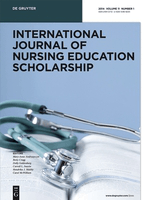
International Journal of Nursing Education Scholarship
Driving the future of nursing education with impactful research.International Journal of Nursing Education Scholarship is a crucial academic platform dedicated to advancing the field of nursing education through rigorous research and scholarship. Published by WALTER DE GRUYTER GMBH in Germany, this journal serves as a key resource for researchers, educators, and practitioners in nursing and related educational fields. With an impressive impact factor and a strong Scopus ranking, notably Rank #44 in General Nursing, the journal occupies a respected position within the Q2 category in both the Education and Nursing sectors. Its open access policy enhances the dissemination of critical findings, facilitating broader access to high-quality nursing education research. Spanning from 2003 to 2025, this publication is committed to fostering innovation and excellence in nursing education, promoting evidence-based practices that ultimately benefit healthcare systems worldwide. As a vital resource for academia and practice, International Journal of Nursing Education Scholarship continuously encourages the discourse on best practices and emerging trends in nursing education.
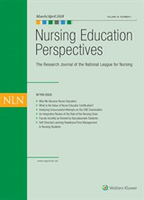
Nursing Education Perspectives
Shaping the Next Generation of Nursing ProfessionalsNursing Education Perspectives is an esteemed peer-reviewed journal published by LIPPINCOTT WILLIAMS & WILKINS, focusing on the vital intersection of education and nursing practice. With an ISSN of 1536-5026 and an E-ISSN of 1943-4685, this journal has been serving the nursing education community since its inception in 2002 and will continue to do so until 2024. In 2023, it achieved a commendable Q2 ranking in Nursing and Q3 in both Education and Miscellaneous Medicine, reflecting its significant contribution to the academic landscape. Although it follows a traditional access model, the journal consistently aims to provide high-quality research, innovative pedagogical strategies, and best practices that can enhance nursing education globally. Given its position within the 49th percentile for General Nursing and Social Sciences, Nursing Education Perspectives is an essential resource for researchers, educators, and practitioners dedicated to advancing nursing training and education.
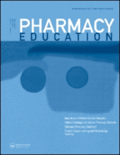
PHARMACY EDUCATION
Fostering excellence in pharmaceutical learning.PHARMACY EDUCATION, an esteemed journal published by the INTERNATIONAL PHARMACEUTICAL FEDERATION, is dedicated to advancing the field of pharmacy education through high-quality research, reviews, and innovative practices. With an ISSN of 1560-2214 and an E-ISSN of 1477-2701, this journal provides a vital platform for educators, researchers, and professionals to discuss contemporary issues and opportunities within pharmaceutical education. Recognized for its relevance, it holds a Q4 ranking in Education and Q3 in both Pharmaceutical Science and Pharmacy as of 2023. Despite its Scopus rankings reflecting a growing niche, with positions such as 30/45 for Pharmacy in Health Professions, it showcases a commitment to nurturing the next generation of pharmacy practitioners. As a crucial resource for enhancing pharmacy curricula and pedagogical strategies, PHARMACY EDUCATION invites contributions from those dedicated to enriching educational methodologies and promoting excellence in pharmaceutical training. This journal plays an essential role in bridging academic research and practical application, encouraging the ongoing evolution in pharmacy education across the globe.

Journal of Korean Academy of Nursing
Pioneering Research for the Future of Nursing.The Journal of Korean Academy of Nursing, published by the Korean Society of Nursing Science, is a leading peer-reviewed journal dedicated to advancing the field of nursing research and practice. Established in 2008, this journal serves as a platform for innovative studies and discussions that address the challenges and developments in nursing. With an impressive 2023 category quartile ranking of Q2 in the field of Nursing and General Nursing, it ranks #58 out of 139 journals, placing it in the 58th percentile—a testament to its scholarly impact. Focused primarily on the nuances of nursing in South Korea and beyond, the journal fosters collaboration among various healthcare professionals and researchers, striving to improve nursing practices through empirical research and evidence-based insights. The journal is accessible to those seeking to engage with the latest findings and trends in nursing, further solidifying its role as an essential resource for researchers, practitioners, and students alike. For access and further details, please refer to the journal's homepage.
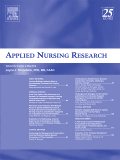
APPLIED NURSING RESEARCH
Connecting Research to Real-World Nursing SolutionsApplied Nursing Research is a premier journal dedicated to the dissemination of high-quality research within the nursing field, published by W B Saunders Co-Elsevier Inc. With an impact factor that places it in the Q1 category for Nursing (miscellaneous), this journal ranks 23rd out of 139 in its Scopus category, firmly establishing itself in the top percentile (83rd). Since its inception in 1988, Applied Nursing Research has provided a vital platform for sharing innovative findings that impact clinical practice and healthcare delivery. The journal serves as an essential resource for researchers, professionals, and students aiming to enhance their knowledge and application of nursing practices. While it does not offer open access, it remains a crucial publication for those seeking to explore contemporary nursing topics and research trends through a rigorous academic lens.
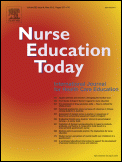
NURSE EDUCATION TODAY
Cultivating Knowledge and Innovation in Nursing Practice.NURSE EDUCATION TODAY is a prestigious academic journal dedicated to advancing the field of nursing education and practice. Published by Churchill Livingstone in the United Kingdom, this journal has been a vital resource since its inception in 1981, with a commitment to improving the standards and methodologies in nursing training. As evidenced by its impressive Q1 ranking in both Education and Nursing categories in 2023, and a remarkable 96th percentile ranking in Nursing (General Nursing), NURSE EDUCATION TODAY stands out as a leading source of evidence-based research, innovative educational strategies, and critical discussions that shape the future of nursing education. The journal provides a platform for researchers, practitioners, and educators to share their findings and experiences, making it essential reading for all stakeholders in the healthcare education landscape. Although it does not offer Open Access, its substantial impact on the nursing education community is significant, with ongoing contributions up to 2024 and beyond.